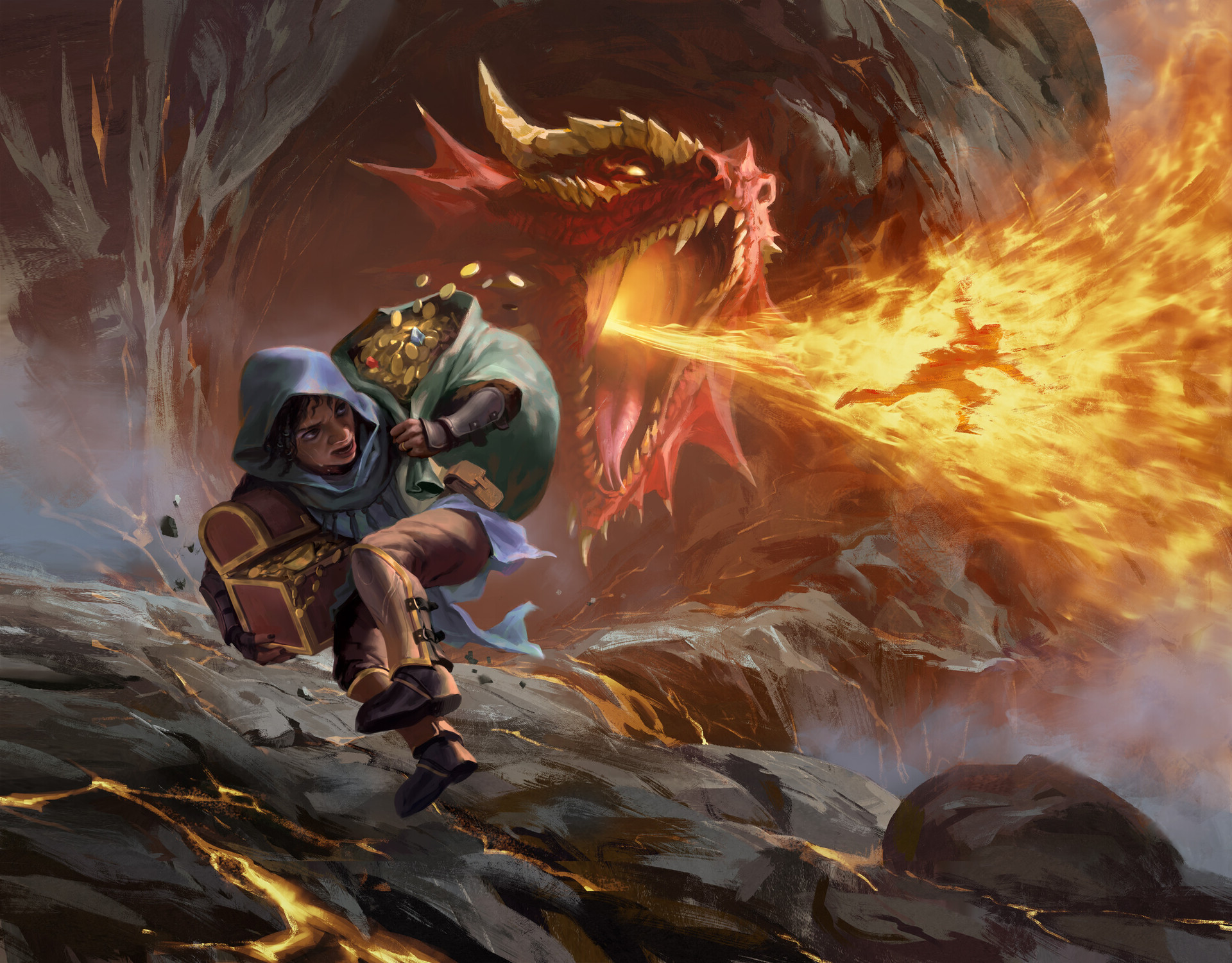

Roguish Archetypes
At 3rd level, a rogue gains the Roguish Archetype feature. The Roguish Archetypes here are available along with those offered in the Player's Handbook: the Bloodknife, Daredevil, Fencer, Gambler, Justicar, Ruffian, Saboteur, Skinchanger, and Surgeon. Also included is the Alternate Assassin.
Bloodknife
The Infernal Legions have many soldiers, but none are more deadly then those known as Bloodknives. The elite warriors of Hell's armies, Bloodknives enhance their significant skills with infernal blood magic. By sacrificing their own vitality, they gain access to sinister abilities beyond the skill of other mortal warriors. Experts at sowing chaos and death among, their foes, Bloodknives are dispatched by the Lords of Hell only when an especially powerful foe needs to be dealt with.
Bloodknife Features
| Rogue Level | Feature |
|---|---|
| 3rd | Dread Strike, Forked Tongue |
| 9th | Sinister Vitality |
| 13th | Hellish Curse |
| 17th | Touch of Death |
Dread Strike
You can sacrifice your own vitality to empower your attacks with infernal magic. Beginning at 3rd level, when you hit a creature with a weapon attack, you can expend one of your Hit Dice to empower the attack with the following benefits:
- You do not need advantage on your attack roll for this attack in order to use your Sneak Attack.
- The damage from your Sneak Attack becomes necrotic.
- If the attack reduces the target to 0 hit points, you regain the Hit Die you expended to use this feature, and you gain temporary hit points equal to your Rogue level.
Forked Tongue
You have been imbued with sinister infernal power that fuels your Bloodknife abilities and alters your physical form. When you adopt this Archetype at 3rd level, you learn to speak, read, and write your choice of Abyssal or Infernal. Depending on the language you learn, you gain additional benefits:
Abyssal. You gain proficiency in Intimidation. Whenever you make a Charisma (Intimidation) check by speaking in Abyssal, you can treat a roll of 7 or lower on the d20 as an 8.
Infernal. You gain proficiency in Persuasion. When you make a Charisma (Persuasion) check to convince a creature to agree to bargain, contract, or an agreement of any kind, you can treat a roll of 7 or lower on the d20 as an 8.
Sinister Vitality
You are able to draw life from the pain you inflict. Starting at 9th level, when you score a critical hit with a weapon attack, you can use your reaction to regain an expended Hit Die.
You can use this reaction a number of times equal to your Charisma modifier (minimum of once), and you regain all expended uses when you finish a long rest.
Hellish Curse
You are able to curse your foes with dark magic. Beginning at 13th level, when you hit a creature with a Dread Strike, you can mutter a curse in the language of your Forked Tongue, causing the target to be blinded, deafened, or unable to speak (your choice) until the beginning of your next turn.
Touch of Death
You are a master of the infernal magic within your soul, and wield magic comparable to the most powerful servants of the Lords of Hell. Starting at 17th level, you can use Dread Strike at will, without expending your Hit Dice to fuel the ability.
When you use Dread Strike, you can expend a Hit Die and force the target to make a Constitution saving throw (the DC equals 8 + your proficiency bonus + your Charisma modifier). On a failed save, the target suffers one level of exhaustion.
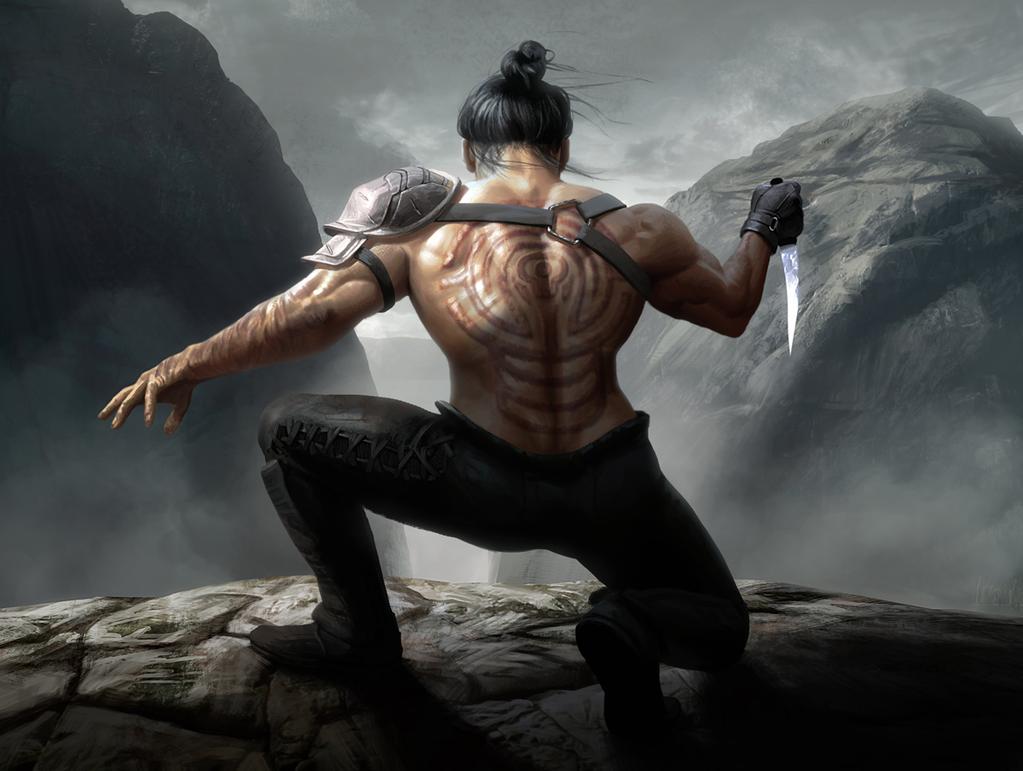
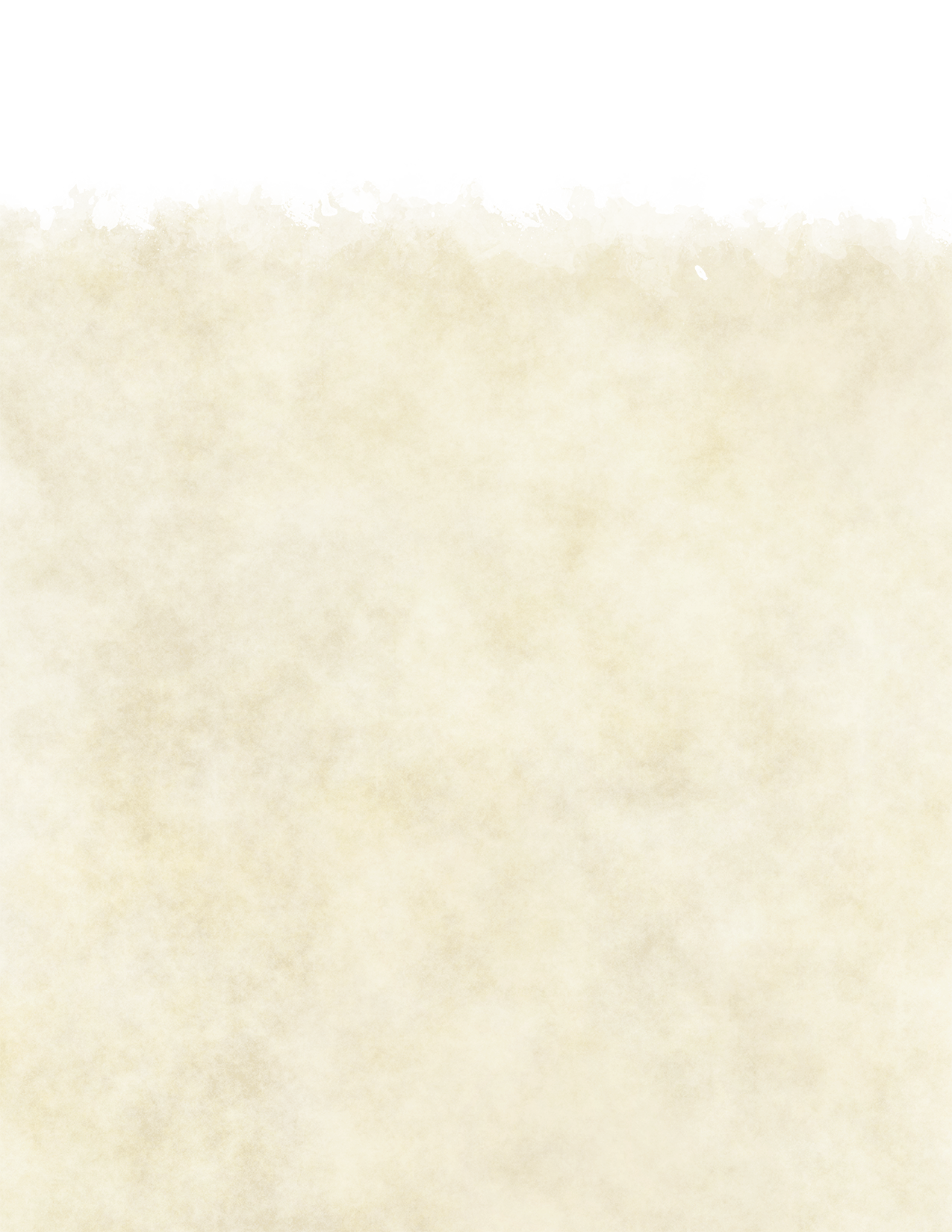


Daredevil
Most people live their lives in safety, doing their best to avoid risky situations. Even most rogues use their skills in stealth and sleight of hand to avoid danger. However, there are some who seek this danger out, living for the adrenaline rush that comes with near death experiences. Daredevils are rogues who would rather leap across rooftops then walk the streets, and in turn, they develop a knack for avoiding certain death.
Daredevil Features
| Rogue Level | Feature |
|---|---|
| 3rd | Aerialist, Death from Above |
| 9th | Slow Fall |
| 13th | Defy Death |
| 17th | Airborne Strikes |
Aerialist
When you leap through the air you appear to be flying to all but the most potent observers. Beginning at 3rd level, you have a climbing speed equal to your movement speed.
In addition, you use your reflexes and acrobatic skill to propel yourself through the air. When you make a running or standing long or high jump, you use your Dexterity score, in place of Strength, to calculate the distance of your jump.
Death From Above
When you adopt this Archetype at 3rd level, you learn to turn your airborne body into a projectile. If you move at least 10 feet through the air, then land within 5 feet of a creature one size larger then you or smaller, you can force it to make a Strength saving throw as an action. (Save DC is equal to 8 + your proficiency bonus + your Dexterity modifier.) On a failure, it falls prone and takes 2d6 bludgeoning damage.
This special attack can apply your Sneak Attack damage, even if it doesn't meet the requirements for Sneak Attack.
Slow Fall
Beginning at 9th level, your experience with
falling from great heights has made you an expert at landing without hurting yourself. Whenever you fall and are not incapacitated, you can reduce any falling damage you would take by an amount equal to five times your rogue level.
If you manage to land on something soft that breaks your fall, like a wagon full of hay, you take no damage from the fall.
Defy Death
Your affinity for risky behavior has been cause for many near death experiences, granting you a certain sad familiarity with death. Starting at 13th level, you add your proficiency bonus to your death saving throws. When you make a death saving throw and the result is a 20 or greater, it has the same effect as if you had rolled a 20 on the d20.
Airborne Strikes
You can maneuver yourself while airborne to strike at your enemies in unexpected ways. Starting at 17th level, you have advantage on attack rolls you make while airborne and at least 5 feet off the ground. Moreover, you have advantage on Dexterity ability checks you make while you are airborne.
Jumping in 5th Edition
As a Daredevil, you use your Dexterity, in place of Strength, to determine the distance you can jump. With a 10 foot running start, high jump a number of feet equal to 3 + your Dexterity modifier, and you can long jump a number of feet equal to your Dexterity score. Your jump's distance is deducted from your remaining movement speed.
If you don't have a 10 foot running start, the distance you can high and long jump is halved.
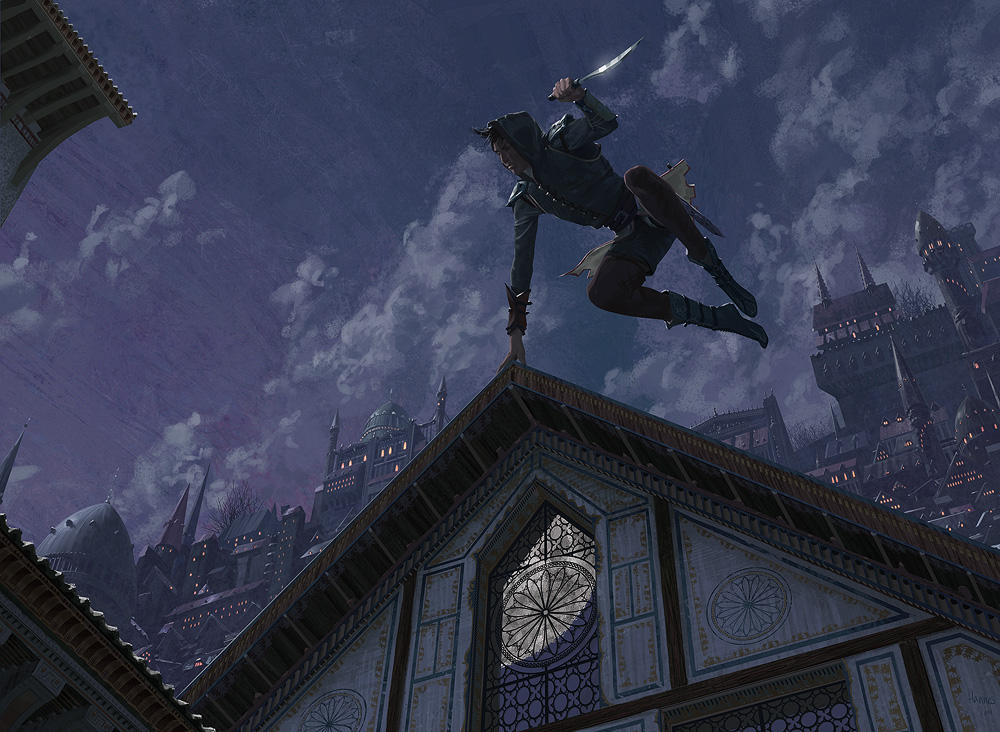



Fencer
While most warriors focus on overcoming their foes through strength of arms or brute force, the archetypal Fencer does so through precise strikes and superior martial abilities. What they lack in overwhelming strength and stamina, they make up for with their finesse, skill, and technique.
Fencer Features
| Rogue Level | Feature |
|---|---|
| 3rd | Classical Training, Fencer's Exploits (d6) |
| 9th | Sharp Reflexes, Fencer's Exploits (d8) |
| 13th | Counterattack |
| 17th | Fencer's Exploits (d10) |
Classical Training
At 3rd level, you gain proficiency with medium armor. You also don't need advantage on your attack roll to apply your Sneak Attack if you use an Exploit as part of that attack.
Fencer's Exploits
You have studied and learned various advanced martial techniques. At 3rd level, you gain the following features:
Martial Exploits. You learn two Exploits of your choice from the list at the end of this Archetype. You can only use one Exploit per ability check or attack. When you gain a level, you can replace one Exploit you know with another of your choice. You learn another Exploit at 9th, 13th, and 17th level.
Exploit Dice. You have three d6 Exploit Dice. To use an Exploit you must expend one of these dice, and you regain all expended Exploit Dice when you finish a short or long rest.
As you gain levels in this class your Exploit Dice grow in size and number. At 9th level you gain a fourth Exploit Die, and your dice become d8s. When you reach 17 level, you gain a fifth Exploit Die and all of your Exploit Dice become d10s.
Saving Throws. Some of your Exploits require your target to make a saving throw to resist your Marital Exploit's effects. The saving throw DC is calculated as follows:
Exploit save DC = 8 + your proficiency bonus + your Strength or Dexterity modifier (your choice).
Sharp Reflexes
Your training has honed your reflexes. Starting at 9th level, you add your proficiency bonus to your initiative rolls.
Counterattack
Starting at 13th level, when a creature hits you with a melee attack, you can Counterattack as a reaction. You gain an extra Exploit Die and make a weapon attack against the attacker. The extra Exploit Die is lost if it is not used to Counterattack.
Fencer Exploits
The Exploits listed below are available to Fencer rogues, who focus on overcoming their foes with skill and technique.
Crippling Strike. When you hit a creature with a melee weapon attack, you can expend an Exploit Die and force it to make a Dexterity saving throw. On a failure, the creature takes additional damage equal to your Exploit Die and its speed is reduced to 0 until the start of your next turn.
Disarm. When you hit a creature with a weapon attack, you can expend an Exploit Die to force it to make a Strength saving throw. On a failure, it takes extra damage equal to your Exploit Die, and it to drops an item of your choice.
Feint. As a bonus action, you can expend an Exploit Die and force a creature that can see you within 30 feet to make a Wisdom saving throw. On a failure, you add your Exploit Die to both your attack and damage roll for the first attack you make against that creature before the end of your next turn.
Fluid Grace. When you make a Dexterity (Acrobatics) or
a Charisma (Performance) check you can expend an Exploit Die and add it to your roll. You can use this Exploit after you roll, but before you know whether you succeed or fail.
Martial Focus. When you make a weapon attack, you can expend an Exploit Die as part of the attack to grant yourself advantage on your attack roll. You can use this Exploit after you roll, but before you know if your attack hits or misses.
Riposte. As a reaction when a creature you can see targets you with a melee attack, you can expend an Exploit Die and add it to your Armor Class against the attack. If the triggering attack misses you, you can immediately make one weapon attack against the attacker as part of the same reaction.
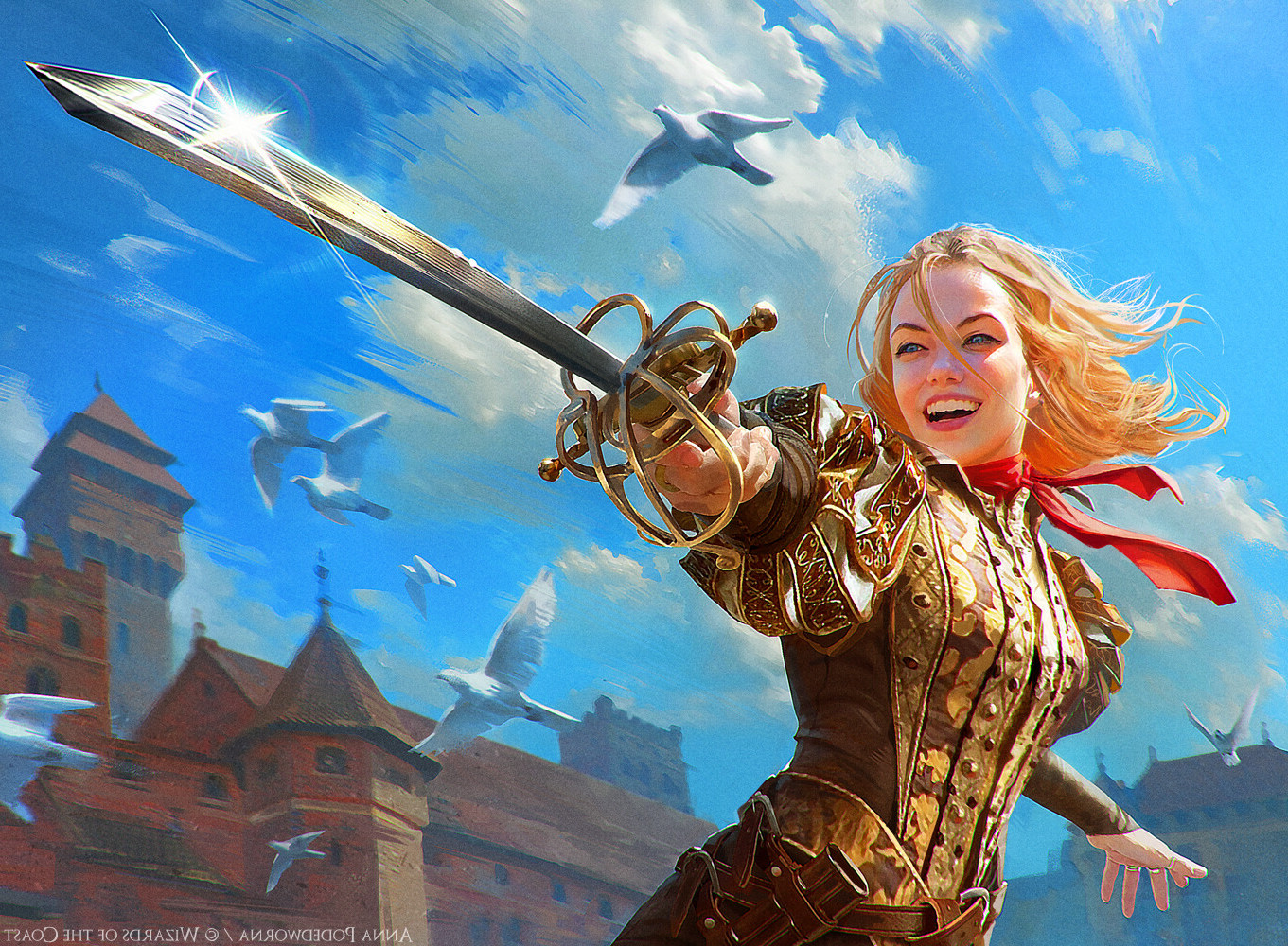



Gambler
While all rogues enjoy risky behavior, the life of a Gambler revolves around this risk. They enjoy nothing more then high stakes situations where they can put everything on the line. Often found in taverns and casinos, these rogues cannot help but gamble away any wealth they acquire in their adventures.
Gambler Features
| Rogue Level | Feature |
|---|---|
| 3rd | Pick a Card, Gambler's Know-how, |
| 9th | Lucky Streak |
| 13th | Quickdraw |
| 17th | Jackpot |
Pick a Card
You can weaponize your trusty deck of cards. Beginning at 3rd level, decks of cards count as improvised weapons for you. When used as a weapon, they have the thrown (30/60) and finesse properties, and on hit, your playing cards deal slashing damage equal to 1d4 + your Dexterity modifier.
Once per turn, when you make a playing card attack the number rolled on the d4 grants your attack a bonus effect:
| Roll | Bonus Effect |
|---|---|
| 1 | The creatures's movement speed is reduced by an amount of feet equal to five times your proficiency bonus. |
| 2 | You can apply your Sneak Attack bonus to this attack even if it doesn't meet the normal requirements for Sneak Attack |
| 3 | You gain temporary hit points equal the damage dealt by this attack. |
| 4 | You can choose to switch places in the initiative order with the target, starting at the top of the next initiative round. |
Gambler's Know-how
In life's games, sometimes you win, and sometimes you need to improvise. When you adopt this Archetype at 3rd level, you gain proficiency with improvised weapons, playing cards, and one other gaming set of your choice. Whenever you make an ability check that uses a gaming set that you are proficient with, you add double your proficiency bonus to your roll.
Also, if you spend at least 1 minute observing or playing a game you aren't familiar with, you can add your proficiency bonus to any ability checks related to that game. Only one game or gaming set can benefit from this feature at a time.
Lucky Streak
Your attacks have been blessed with an entertaining, yet strange, luck. Starting at 9th level, your attack rolls score a critical hit on a roll of 7 or 20 on the d20, but rolls of 13 or 1 on the d20 are both considered critical failures. Good luck!
Quickdraw
Beginning at 13th level, you have advantage on your initiative rolls, and the first Pick a Card attack you make after rolling initiative gains a bonus effect of your choice.
Jackpot
Your good fortune is another's bad luck. Starting at 17th level, whenever you roll a 6 on a d6 for one of your Sneak Attack dice, you roll an additional d6 and add it to your damage roll.
Alternate Rule: Playing Cards
When you play a Gambler rogue, you can choose to use a standard deck of 52 poker cards (and jokers) to determine the bonus effect for your Pick a Card feature. When you hit with a playing card attack, draw a random card from your deck. The card's suit determines the bonus effect for Pick a Card:
Clubs (1), Diamonds (2), Hearts (3), Spades (4). If you draw a joker, you pick which effect happens.
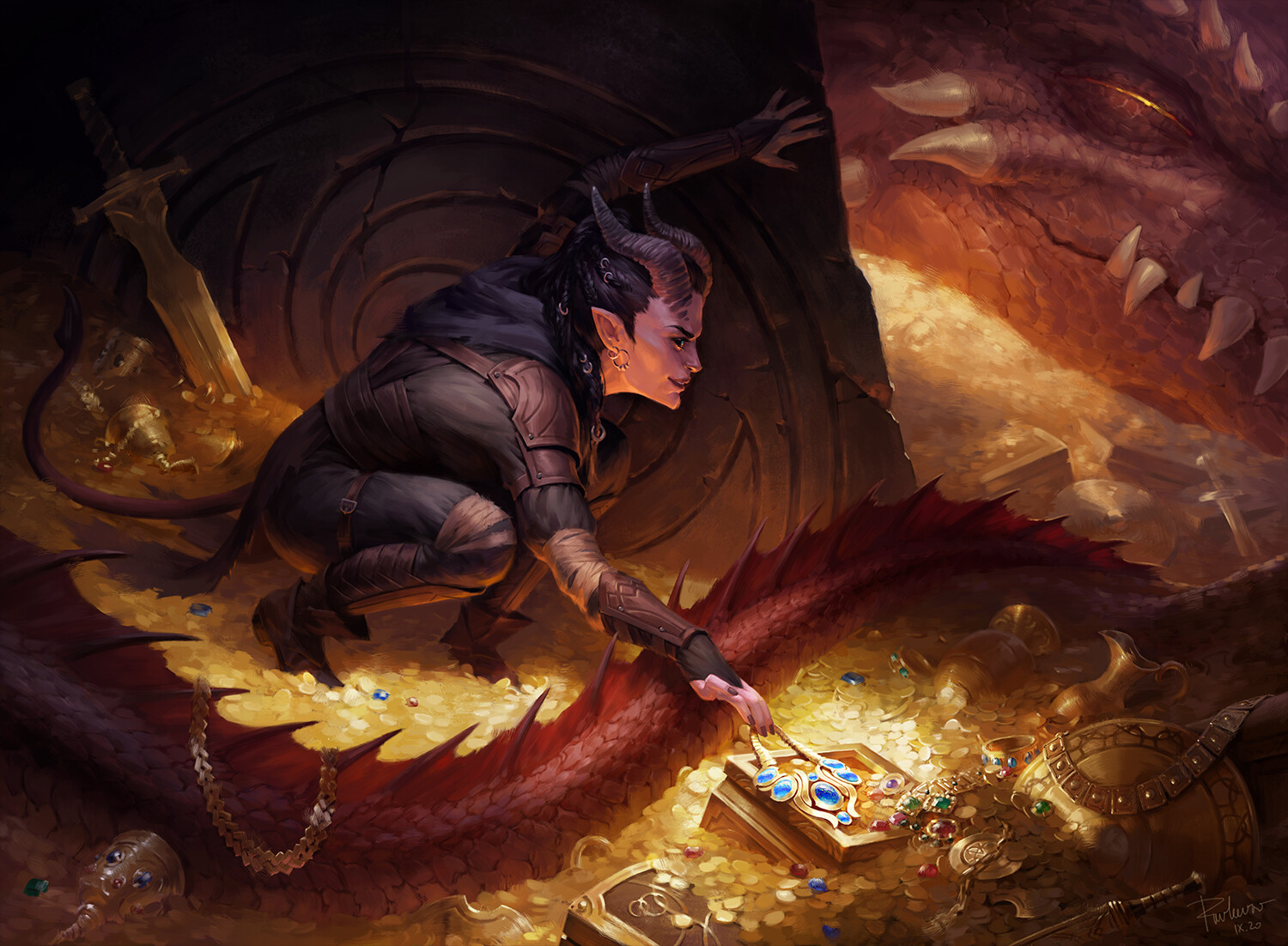


Justicar
Most adventurers who serve the gods do so openly as priests, clerics, and paladins. However, some dark and ruthless gods bestow divine power upon Justicars. These zealous servants work tirelessly to impose the will of their god, and resort to whatever means they deem necessary. Operating in the shadows, and driven only by faith, they answer to no mortal.
Justicar Features
| Rogue Level | Feature |
|---|---|
| 3rd | Spellcasting, Channel Divinity, Divine Sense |
| 9th | Consecrated Strikes |
| 13th | Divine Judgment |
| 17th | Anointed Inquisitor |
Spellcasting
At 3rd level, your conviction and faith allow you to produce divine spells, much like a cleric or a paladin does.
Cantrips. You learn two cantrips of your choice from the Justicar Spell List at the end of this Archetype, and you learn an additional Justicar cantrip when you reach 10th level.
Spell Slots. The Justicar Spellcasting table shows how many spell slots you have to cast your spells of 1st-level and higher. To cast one of these spells, you must expend a slot of the spell's level or higher. You regain all expended spell slots when you finish a long rest. For example, if you know the wrathful smite spell and have both a 1st and a 2nd-level spell slot, you can cast wrathful smite using either spell slot.
Spells Known of 1st-Level and Higher. You know three 1st-level justicar spells. The Spells Known column of the Justicar Spellcasting table shows when you learn more spells of 1st-level or higher, of a level for which you have spell slots.
When you gain a level, you can replace one of your Spells Known with another spell from the Justicar Spell List. The spell must also be of a level for which you have spell slots.
Spellcasting Ability. Charisma is your spellcasting ability for justicar spells, as your power is fueled by belief. You use Charisma whenever a spell refers to your spellcasting ability. You also use your Charisma modifier when setting the saving throw DC or making a spell attack roll for a justicar spell.
Spell save DC = 8 + your proficiency bonus
+ your Charisma modifier
Spell attack modifier = your proficiency bonus
+ your Charisma modifier
Channel Divinity
Also at 3rd level, you gain the ability to channel divine energy directly from your god, and can use it to fuel magical effects. You start with one such divine effect, Shroud of Faith.
Once you use your Channel Divinity, you must finish a short or long rest before you can use it again. Upon reaching 13th level, you can use it twice between short or long rests.
Shroud of Faith. As an action, you grip your holy symbol and invoke the protection of your god. You, and anything you are wearing or carrying, becomes invisible for up to 1 minute. This effect ends early if you attack or cast a spell.
Justicar Spellcasting
| Rogue Level |
Spells Known |
1st Level |
2nd Level |
3rd Level |
4th Level |
|---|---|---|---|---|---|
| 3rd | 3 | 2 | — | — | — |
| 4th | 4 | 3 | — | — | — |
| 5th | 4 | 3 | ─ | — | — |
| 6th | 4 | 3 | ─ | — | — |
| 7th | 5 | 4 | 2 | — | — |
| 8th | 6 | 4 | 2 | — | — |
| 9th | 6 | 4 | 2 | — | — |
| 10th | 7 | 4 | 3 | — | — |
| 11th | 8 | 4 | 3 | — | — |
| 12th | 8 | 4 | 3 | — | — |
| 13th | 9 | 4 | 3 | 2 | — |
| 14th | 10 | 4 | 3 | 2 | — |
| 15th | 10 | 4 | 3 | 2 | — |
| 16th | 11 | 4 | 3 | 3 | — |
| 17th | 11 | 4 | 3 | 3 | — |
| 18th | 11 | 4 | 3 | 3 | — |
| 19th | 12 | 4 | 3 | 3 | 1 |
| 20th | 13 | 4 | 3 | 3 | 1 |
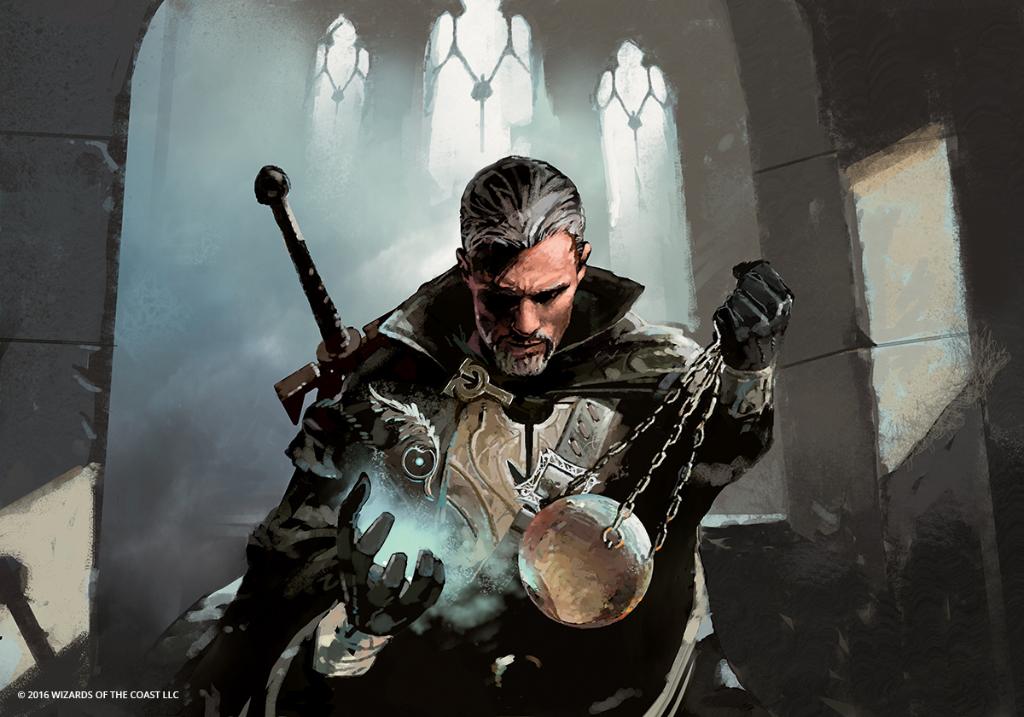




Divine Sense
The presence of evil registers on your senses like a noxious odor, and good rings like music in your ears. Starting at 3rd level, you can use a bonus action to open your awareness to detect such creatures in your presence. Until the end of your next turn, you know the location of any celestials, fiends, or undead within 60 feet that are not shielded from divination magic. You know the creature type of any creature whose presence you sense, but not its identity. You also detect the presence of any place or object that has been consecrated or desecrated, as with the hallow spell, within the same radius.
Once you use this feature you must finish a short or long rest before you can use it again. If you have no uses left, you can expend a spell slot of 1st-level or higher to use it again.
Consecrated Strikes
Your god has consecrated your weapons. Beginning at 9th level, when you hit a creature with an attack that includes Sneak Attack damage, you can expend a spell slot of 1st-level or higher to empower your strike with radiant judgment.
The additional damage from your Sneak Attack becomes radiant damage, and if you roll a 1 or 2 on any of damage dice for this attack, you can re-roll the die, though you must use the new roll, even if your new roll is a 1 or a 2.
Divine Judgment
You pour out divine wrath on those you mark as blasphemers or heretics. Starting at 13th level, you can use a bonus action to mark a creature you can see within 30 feet as a foe of your god. While marked, any attack you make against that creature scores a critical hit on a roll of 19 or 20 on the d20.
Your mark lasts for 1 minute, and ends early if you are incapacitated or you mark another creature. Once you mark
a creature you must finish a short or long rest before you can use it again. If you have no uses remaining, you can expend a spell slot of 3rd-level or higher to use it again.
Anointed Inquisitor
Beginning at 17th level, the power of your belief grants you a boon of protection against any magic that would hinder you from carrying the will of your god. Whenever you are forced to make a saving throw, you gain a bonus to the saving throw equal to your Charisma modifier (minimum of +1).
Justicar Spell List
Here's the list of spells you consult when you learn a Justicar spell. It is organized by spell level, not character level. The spells below are from the Player's Handbook, Xanathar's Guide to Everything*, and Tasha's Cauldron of Everything**.
Cantrips (0-Level)
blade ward
booming blade**
green-flame blade**
guidance
light
resistance
sacred flame
sword burst**
thaumaturgy
toll the dead
true strike
word of radiance*
1st-Level
arms of hadar
bane
bless
cause fear*
ceremony*
charm person
command
compelled duel
comprehend languages
divine favor
expeditious retreat
guiding bolt
heroism
inflict wounds
sanctuary
searing smite
shield of faith
thunderous smite
unseen servant
witch bolt
wrathful smite
2nd-Level
aid
augury
blindness/deafness
branding smite
darkness
invisibility
locate object
mind spike*
misty step
shadow blade*
silence
suggestion
zone of truth
3rd-Level
bestow curse
blinding smite
clairvoyance
daylight
enemies abound*
fear
hunger of hadar
speak with dead
spirit shroud**
vampiric touch
4th-Level
banishment
blight
death ward
divination
freedom of movement
locate creature
shadow of moil*
staggering smite
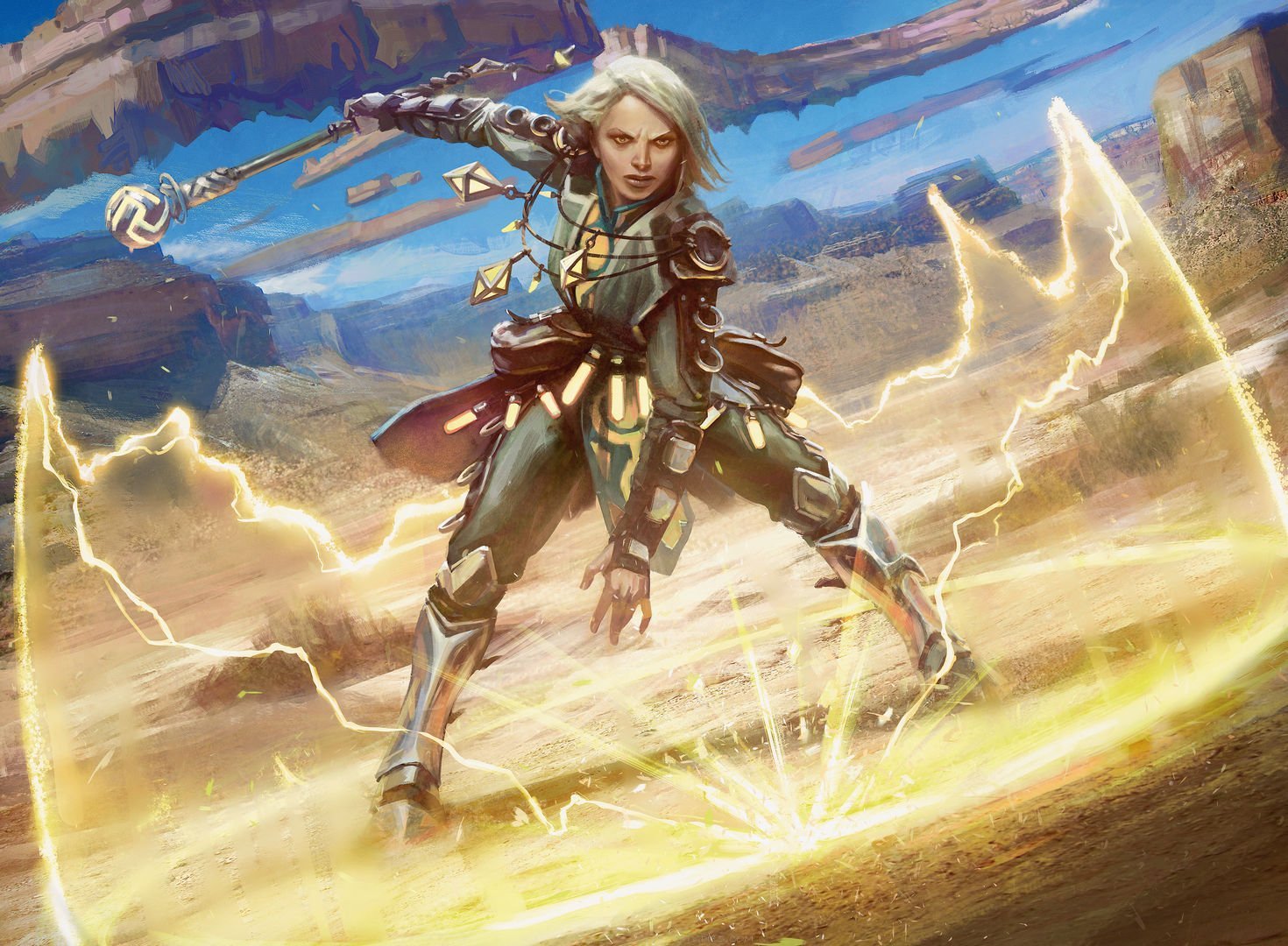



Ruffian
Not all rogues rely on stealth and deception to defeat their foes. Ruffians are the rogues who like to face their enemies directly, and strive to overcome them with devastating blows and ruthless combat techniques. Often employed as hired muscle for thieves' guilds, criminal syndicates, and other organizations that don't shy away from force, Ruffians can be found in almost any village, city, or town where crime exists.
Ruffian Features
| Rogue Level | Feature |
|---|---|
| 3rd | Enforcer, Shake Down |
| 9th | Imposing Glance, Nerves of Steel |
| 13th | Dodge and Counter |
| 17th | Ruthless Strike |
Enforcer
You use tricks not often employed by rogues. When you adopt this Archetype at 3rd level, you gain the features below:
- You gain proficiency in Intimidation, and you can use your Strength, instead of Charisma, for Intimidation checks.
- When you make an unarmed strike, it deals bludgeoning damage equal to 1d4 + your Strength modifier.
- You can use your Sneak Attack with any weapon in which you are proficient, including unarmed strikes, so long as it does not have the heavy or the two-handed property.
- You can use the bonus action granted by Cunning Action to make a grapple attack against a creature within reach.
- You can use your Constitution, instead of Dexterity, to calculate your Armor Class in light and medium armor.
Shake Down
Your work requires skills that you have become particularly reliable in employing. Starting at 3rd level, when you make a Strength (Athletics), or a Strength (Intimidation) check, you can treat a roll of 7 or lower on the d20 as an 8.
Imposing Glance
Your glance strikes fear into the hearts of the weak. Starting at 9th level, you can use a bonus action to make a Strength (Intimidation) check targeting a creature within 30 feet that can see you, contested by the its Wisdom (Insight) check. If you succeed, the target is frightened of you until the start of your next turn, and you have advantage on the first attack roll you make against it before the start of your next turn.
You can use this feature a number of times equal to your Strength modifier (a minimum of once), and you regain all expended uses when you finish a short or long rest.
Nerves of Steel
Fear is a weapon to be used against cowards and the weak willed, and you are not so easily intimidated. Upon reaching 9th level, you gain immunity to the frightened condition.
Dodge and Counter
Beginning at 13th level, you can redirect the force of your enemies' blows against them. As a reaction when a creature that is one size larger then you or smaller misses you with a melee attack, you can force the creature to make a Dexterity saving throw. (Save DC is equal to 8 + your proficiency bonus + your Strength modifier). On a failed save, it is knocked prone and has its speed reduced to zero until the end of your next turn, or it is grappled by you (your choice).
You must have at least one free hand at the time of this reaction in order to grapple a creature with this feature.
Ruthless Strike
You can combine a creature's fear with your deadly attacks to strike with ruthless efficiency. Beginning at 17th level, when you hit a creature that is frightened of you with a weapon attack or unarmed strike that includes your Sneak Attack damage, your attack becomes an automatic critical hit.
You can use this feature a number of times equal to your Strength modifier (minimum of once), and you regain all expended uses when you finish a short or long rest.
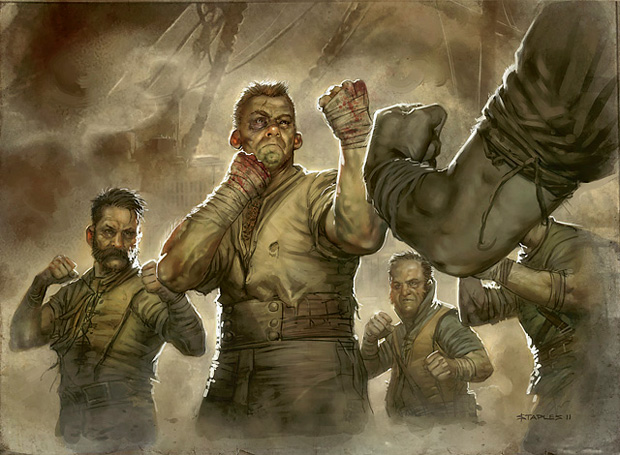


Saboteur
Some rogues combine their various skills with an interest in alchemy to produce explosive effects. Known as Saboteurs, these strange alchemists have many specialties; demolition, siege warfare, entertainment. No matter their focus, they all delight in violent destruction, and due to the rarity of their talents, Saboteurs are invaluable allies or dangerous foes.
Saboteur Features
| Rogue Level | Feature |
|---|---|
| 3rd | Destructive Strikes, Explosives |
| 9th | Advanced Alchemy |
| 13th | Sabotage |
| 17th | Hair Trigger |
Destructive Strikes
Your work has given you a knack for identifying structural weak points. Starting at 3rd level, when you hit a non-magical structure with a weapon attack or one of your explosives, it is considered an automatic critical hit. Also, when you attack a construct, you score a critical hit on an attack roll of 19 or 20.
Explosives
At 3rd level, you gain proficiency with alchemist's tools, along with the secrets of creating explosive Black Powder:
Black Powder Charges. At the end of each long rest, you can use your alchemist's supplies to produce a number of Black Powder Charges equal to your proficiency bonus + your Intelligence modifier (minimum of 1). These Charges are used to craft the explosives you know, and become inert
if they are not used by the end of your next long rest.
Explosives Known. You learn how to make three types of explosives; a Hand Bomb, and two other explosives of your choice from the list at the end of this Archetype description.
When you gain a level in this class, you can replace one explosive you know with another explosive of your choice.
You learn to craft two additional explosives of your choice when you reach 9th, 13th, and 17th level in this class.
Explosive Save DC. Some of your explosives require your target to make a saving throw to resist their explosive effects. Your Explosive Save DC is calculated as follows:
Explosive Save DC = 8 + your proficiency bonus
+ your Intelligence modifier
Advanced Alchemy
Starting at 9th level, your mastery of alchemy allows you to alter the explosives you make in the following ways:
Appearance. You can alter the outward appearance of an explosive. When they are unlit, creatures must succeed on an Intelligence (Investigation) check against your Explosive Save DC in order to recognize the object as an unlit explosive.
Color. You alter the color of both explosive itself, the color of the explosion, and the color of the smoke it produces.
Damage Type. You alter the damage type of any explosive you craft to bludgeoning, piercing, fire, thunder, or lightning.
Sabotage
Starting at 13th level, creatures that are surprised have disadvantage on saving throws against your Explosives.
Hair Trigger
You have learned to detonate your Explosives from afar. Beginning at 17th level, when you craft an Explosive, you can create a rudimentary arcane remote to trigger the Explosive from afar. As an action, you can trigger the Explosive as long as you are within 100 feet.
Explosives
The following Explosives are available for a Saboteur rogue to learn. As an action, you can craft an explosive, using the amount of Black Powder Charges detailed in the description. Any explosives become inert at the end of your next long rest.
Hand Bomb (1 Charge). As an action you can ignite the explosive and throw it at a creature you can see within 60 feet, forcing it to make a Dexterity saving throw. They take 2d6 fire damage on a failed save, and half as much damage on a success. You add your Sneak Attack bonus to the fire damage even if you don't meet the normal requirements.
Arcane Explosives. The Arcane Explosives table below details spell effects you can replicate with your Explosives. Each time you learn a new Explosive, you can choose one spell effect from the list below to learn, so long as you meet the prerequisite level, which refers to your rogue level. If a spell normally requires concentration, the explosive version of that spell does not and lasts the full duration.
Arcane Explosives
| Level | Charges | Spell Effects |
|---|---|---|
| 3 | 1 | earth tremor, fog cloud, grease |
| 5 | 3 | blindness/deafness, enlarge/reduce, pyrotechnics, web |
| 9 | 5 | erupting earth, fireball, stinking cloud |
| 13 | 7 | banishment, sickening radiance, vitriolic sphere |
| 17 | 9 | cloudkill, immolation, insect plague maelstrom, synaptic static |
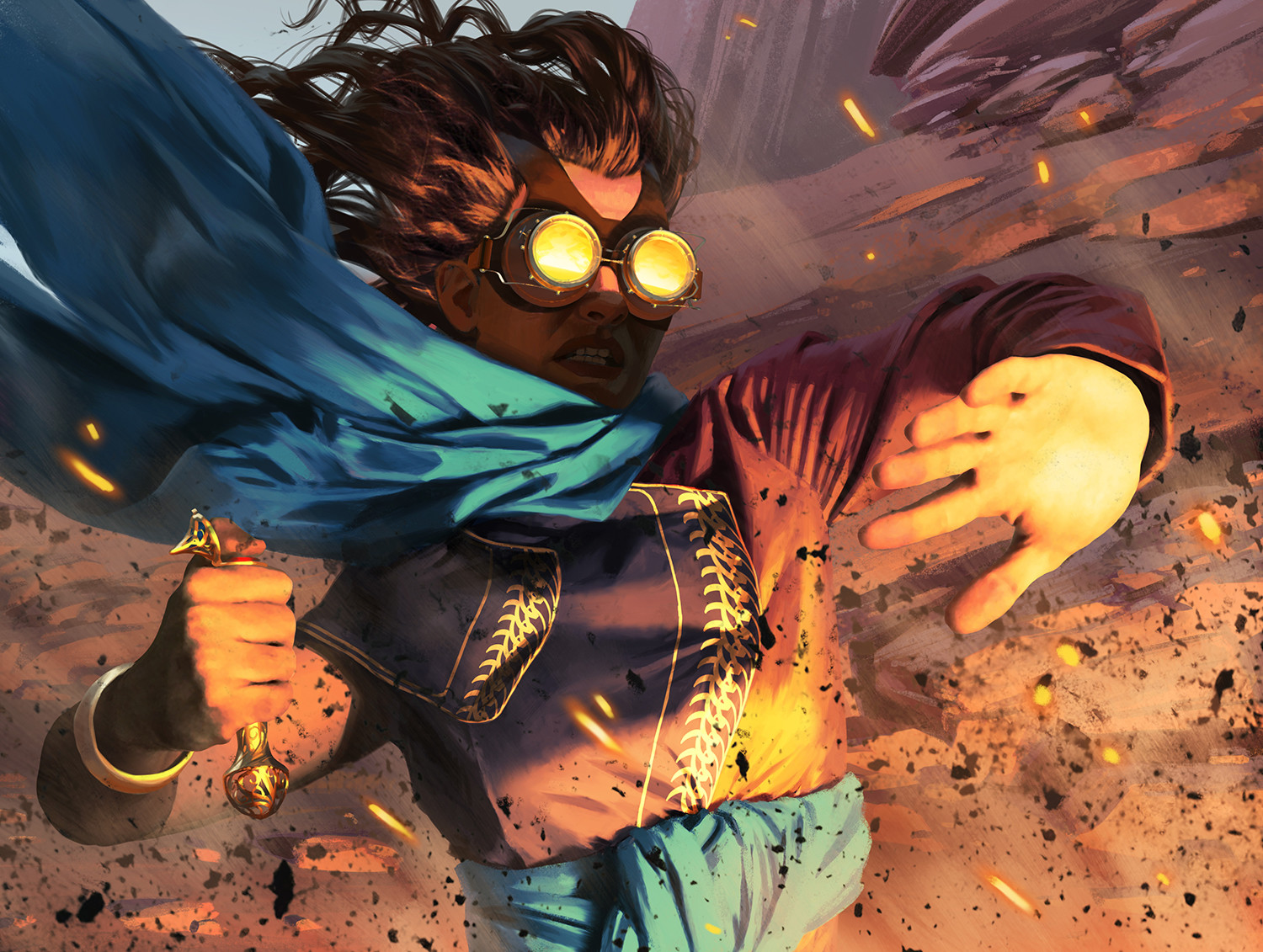



Skinchanger
The traditions and abilities of Druidic Circles are some of the most closely guarded mortal secrets, only taught to druidic initiates. However, even the most well guarded secrets can be stolen by the right thief. Skinchangers are the rogues who have acquire druidic magic through untraditional means.
While most Skinchangers are infamous for acquiring their abilities through trickery and theft, some work alongside of druids and are selected to carry out specialized missions.
Skinchanger Features
| Rogue Level | Feature |
|---|---|
| 3rd | Druidic Secrets, Limited Wild Shape |
| 9th | Instinctual Strike |
| 13th | Bestial Senses |
| 17th | Druidic Mastery |
Druidic Secrets
When you steal the secrets of this Archetype at 3rd level, you learn to speak, read, and write Druidic, the secret language of druids. You can use this language to leave hidden messages. Those who know Druidic always notice such messages. You also count as both a druid and a rogue for the purposes of attuning to magic items and using spell scrolls.
Limited Wild Shape
The druidic magic you have acquired allows you to steal the forms of natural creatures. Starting at 3rd level, you can use a bonus action to magically assume the form of any beast that you have touched before. Your rogue level limits the beasts you can transform into, as shown in the Skinchanger Beast Shapes table. You must follow all the other rules for Wild Shape as detailed in the druid class description.
You can stay in Wild Shape for up to one hour, at which point you revert to your normal form. You can revert to your normal form earlier if you use a bonus action to do so, or if you fall unconscious, you drop to 0 hit points, or you die.
Once you use your Wild Shape feature you must finish
a short or long rest before you can Wild Shape again.
Skinchanger Beast Shapes
| Level | Max CR | Limitations | Example |
|---|---|---|---|
| 3rd | 1/4 | No Flight or Swim Speed |
Panther |
| 9th | 1/2 | No Flight Speed | Reef Shark |
| 13th | 1 | — | Giant Eagle |
| 17th | 2 | — | Cave Bear |
Instinctual Strike
Your druidic magic suffuses your body when you Wild Shape. Starting at 9th level, your attacks while you are Wild Shaped count as magical for the purposes of overcoming resistances and immunity to non-magical damage. Moreover, you can use your Wild Shape twice between each short or long rest.
In addition, your familiarity with both druidic magic and the animal shapes you employ grants you an additional way to use your Sneak Attack. Your natural weapon attacks while you are transformed with Wild Shape can apply your Sneak Attack, even if you don't have advantage on your attack roll.
Bestial Senses
Your time spent in the shape of other animals has enhanced the senses of your normal form. Beginning at 13th level, you have advantage on any Wisdom (Perception) or Wisdom (Survival) checks that rely on your sense of hearing or smell.
Druidic Mastery
Upon reaching 17th level, your mastery over the use of nature magic allows you to make better use of your Wild Shape. You can remain in your Wild Shape transformation indefinitely.
Druids & Skinchangers
While the lore described here depicts Skinchangers and Druids as enemies, that is not true everywhere. Sometimes, Druidic Circles will conscript rogues to carry out missions and imbue them with a fraction of their powerful and ancient druidic magic.



Surgeon
When an adventurer is maimed by a monster or a soldier is wounded in battle, and the luxury of magical healing is not an option, Surgeons step up to fill the void. Using their intimate understanding of anatomy and biology, Surgeons can analyze any ailment, and, when pressed, they can turn their medical knowledge onto their foes, crippling them with precise cuts.
Surgeon Features
| Rogue Level | Feature |
|---|---|
| 3rd | Anatomical Studies, Surgical Strike |
| 9th | Cultivated Immunity |
| 13th | Improved Surgical Strike |
| 17th | Expert Surgeon |
Anatomical Studies
You have spent years studying the science of medicine in order to improve your surgical skills. When you adopt this Archetype at 3rd level, you gain proficiency in both Medicine and Nature, and whenever you make a Wisdom (Medicine) check, you treat a roll of 7 or lower on the d20 as an 8.
Moreover, you can use your bonus action granted by Cunning Action to take the Use an Object action. However, you can only use this special Use an Object action to make use of a healer's kit or a potion that restores hit points.
Surgical Strike
Beginning at 3rd level, you can weaponize your anatomical knowledge to cripple your foes in combat. Your attack rolls against humanoids, beasts, giants, monstrosities, and undead creatures score a critical hit on a roll of 19 or 20 on the d20.
Moreover, when you hit a creature with an attack that applies your Sneak Attack damage, you can inflict one of the conditions below in place of adding Sneak Attack damage.
Cripple. The target's movement speed is reduced by an amount of feet equal to five times your Wisdom modifier (minimum of 5 feet) until the beginning of your next turn.
Daze. The target cannot take opportunity attacks until the start of your next turn, and it must subtract your Wisdom modifier (minimum of -1) from its next saving throw.
Infect. You force the creature to make a Constitution saving throw (DC equals 8 + your proficiency bonus + your Wisdom modifier). On a failed save, the creature is poisoned until the beginning of your next turn.
Maim. You force the target to make a Dexterity saving throw (DC equals 8 + your proficiency bonus + your Wisdom modifier). On a failed save, the target is blinded, deafened, or cannot speak (your choice) until the end of your next turn.
Cultivated Immunity
The time you have spent around various infectious diseases and toxins has improved your immune system. Beginning at 9th level, when you take acid, necrotic, or poison damage, you reduce the damage by an amount equal to your proficiency bonus + your Wisdom modifier (minimum of 1).
Additionally, you have advantage on saving throws to resist the effects of poisons, diseases, and any other toxins.
Improved Surgical Strike
You have learned much about the anatomy of the creatures of the multiverse. Starting at 13th level, your attack rolls against all creatures except for constructs, oozes, and plants score a critical hit on a roll of 18 through 20 on the d20.
Moreover, when you inflict one of the conditions from your Surgical Strike feature, you can still deal your Sneak Attack damage to the target in addition to the additional effect.
Expert Surgeon
You have become an expert at analyzing your foe's on the fly. Starting at 17th level, when you make a Wisdom (Medicine) check, you can use your rogue level in place of a d20 roll.
In addition, you gain access to surgical abilities that rival the most powerful arcane and divine magics. As an action, you can touch a creature and inflict the effects of either the contagion or regenerate spell, using your Wisdom in place
of a spellcasting modifier. Once you recreate either spell you must finish a short or long rest before you can do so again.
The Science of Medicine
As a Surgeon, you have spent a significant amount of time studying the practice of medical science. As an optional rule, you can replace any mention of Wisdom from this subclass with your Intelligence. Medicine would also become an Intelligence-based skill, used to recall medical knowledge of aliments, afflictions, and conditions present in your world.
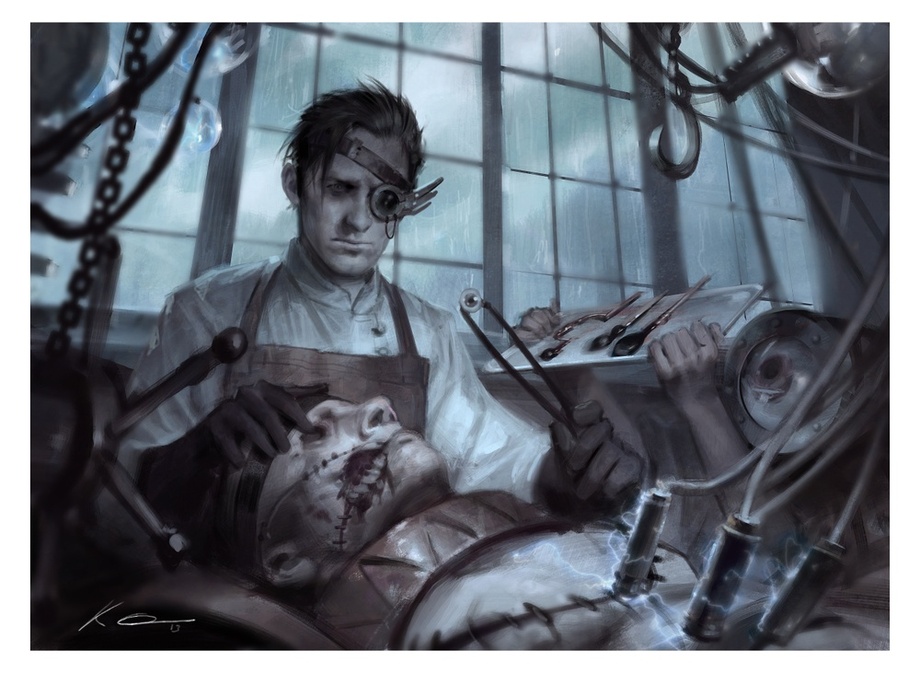



Alternate Assassin
The Assassin Roguish Archetype was originally published in the Player's Handbook, and is widely regarded as one of the more underwhelming subclasses, as it fails to deliver on its fantasy. The Alternate Assassin is an attempt to bring the Assassin up to par with the other official rogue subclasses.
Alternate Assassin Features
| Rogue Level | Feature |
|---|---|
| 3rd | Assassin's Strike, Infiltrator |
| 9th | Stolen Identity |
| 13th | Impostor, Poisoned Blade |
| 17th | Death Strike |
Assassin's Strike
You are at your deadliest when your enemies don't see you coming. Starting at 3rd level, you gain the following benefits:
- You have advantage on any attack rolls you make against creatures that have not yet acted in combat.
- When you hit a creature that is surprised with an attack, your attack becomes an automatic critical hit.
- When you score a critical hit and roll a 1 on any of your damage dice for that attack, you can re-roll those dice. You must use the new roll, even if you roll another 1.
Infiltrator
You have the skills to infiltrate and sow death wherever your target dwells. When you adopt this Archetype at 3rd level, you gain proficiency with the disguise kit and the poisoner's kit.
Moreover, when you make a Charisma (Deception) check while wearing a disguise you created with your disguise kit, you can treat a roll of 7 or lower on the d20 as an 8.
Stolen Identity
You have mastered the dark art of stealing another creature's identity. Starting at 9th level, over the course of an hour, you can craft a perfect disguise of a humanoid creature you have slain, so long as you have the corpse and a disguise kit. To see through your disguise, a creature must succeed on an Intelligence (Investigation) or a Wisdom (Insight) check, contested by your Charisma (Deception) check.
Also, over an 8 hour period, which can be during a long rest, you can use this disguise to completely assume the life of the slain humanoid. After which, other creatures believe you to be that person until given an obvious reason not to.
Impostor
The skill with which you adopt another creautre's identity is nearly supernatural. Beginning at 13th level, when you make a Charisma (Deception) check to thwart a creature trying to see through your disguise you have advantage on your roll.
Poisoned Blade
Your skills with a poisoner's kit have grown beyond normal limits. At 13th level, you can use a bonus action to soak your blade with poison. The next time you hit with an attack with that blade, you can apply your Sneak Attack bonus, even if you don't meet the normal requirements for Sneak Attack, and your Sneak Attack damage becomes necrotic damage.
Once you use this bonus action you must finish a short or long rest before you can use it again.
Death Strike
You have become a master of instant death. Starting at 17th level, when you hit a creature with a Sneak Attack, you can cause the attack to become an automatic critical hit.
Once you use this feature you must finish a short or long rest before you can use it again.
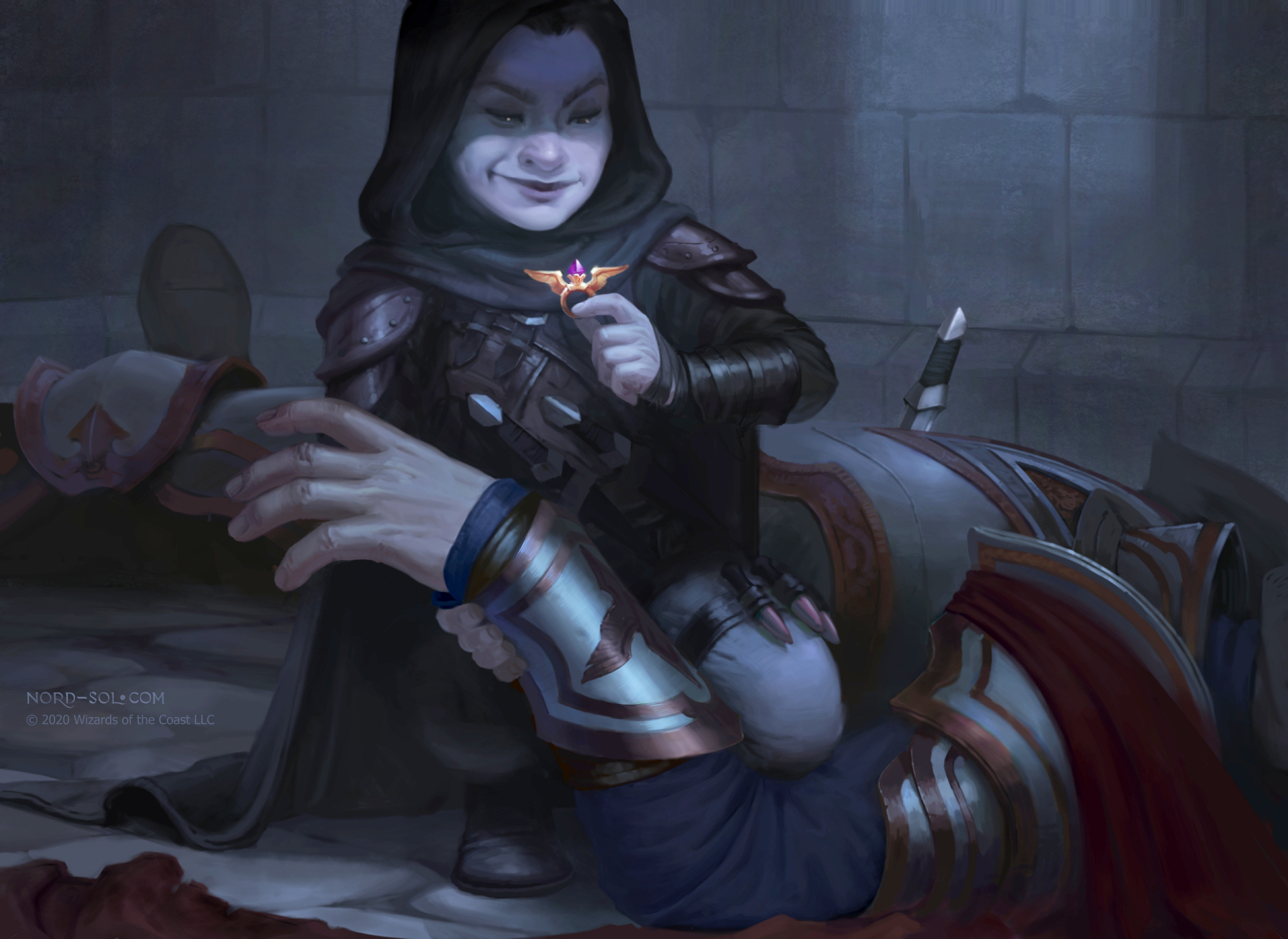



Roguish
Archetypes
Wield the impressive Skills and Abilities of Ten new Roguish Archetypes for the Rogue in 5e.
Bloodknife - Daredevil - Fencer - Gambler
Justicar - Ruffian - Saboteur - Skinchanger
Surgeon - Alternate Assassin
Version 2.0.1 - Created by /u/laserllama
Artist Credits:
Covers - Billy Christian - Reckless Endeavor
Page 1 - Mike Bierek - Infernal Scarring
Page 2 - algenpfleger - Duskmantle Prowler
Page 3 - Anna Podedworna - Dueling Rapier
Page 4 - Anna Pavleeva - Hoard Robber
Page 5 - David Seguin - Hope Against Hope
Page 6 - C. Balanescu - Angelheart Protector
Page 7 - Greg Staples - Instigator Gang
Page 8 - Joseph Meehan - Madcap Experiment
Page 9 - Rudy Siswanto - Squirrel Mob
Page 10 - Karla Ortiz - Stitcher Geralf
Page 11 - Irina Nordsol - Deadly Dispute
